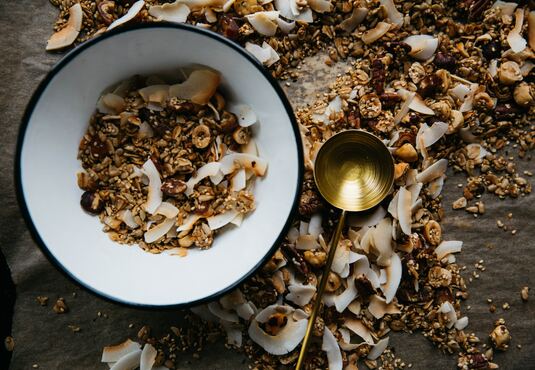
How to start the day right
A healthy diet not only includes making the right choice and composition, but also the choice and ingredients of meals. The older generations seem to know the best ways to eat: in the morning like a king, at noon like a prince and in the evening like a beggar. There was absolutely no question of skipping breakfast!
Refraining from breakfast is still a common trend today. For some, the decisive reason is time, which is preferred to be credited to sleeping time. Others are not hungry early in the morning, or they think this is an easy way to save some calories (which are usually made up again later anyway). It doesn't matter why - breakfast is a very important meal, that's the clear message from numerous experts. Many studies confirm the positive effect of the morning meal.
Breakfast ends the nocturnal food break. Since our brain is dependent on the constant supply of energy and nutrients, the influence of the first meal on cognitive performance is obvious. Studies on children and adolescents in particular show that attention and academic performance largely depend on whether breakfast is consumed. In addition, it is scientifically clear that our diet can affect the efficiency of the brain. An aspect on which it is worth paying attention to in demanding everyday working life. Research results on mental health of almost 400,000 children, adolescents and adults are of particular interest: Those studies indicate a higher incidence of stress, psychological stress and even depression among those who refuse to eat breakfast.
Probably surprising, especially for those who keep an eye on their calorie balance or their body weight: It has been proven that the risk of being overweight and obesity increases if you skip breakfast. The question of which and how many meals a day are the ideal solution can certainly not be answered across the board. Eating a good quality meal in the morning seems to help make the rest of the diet healthier and more helpful during the day. An effect that could possibly also explain the further positive influence of breakfast on the metabolism, heart and blood vessels. Studies show, for example, that those who refuse to eat breakfast are more likely to have a heart attack.
For a good and valuable start to the day, breakfast should consist of the following food groups:
- Whole grain products (bread / pastries, cereal flakes / muesli)
- Milk and or milk products
- Fruit or vegetables, it can also be a small glass of 100% fruit or vegetable juice
Breakfast shakes are a good alternative for those who don't have a appetite in the morning. Also, juices made from 100% fruit and/or mixed with curd cheese or yoghurt and oat flakes are a good idea
Ideally - or as often as possible - breakfast is a meal together. Try eating together before partners or children go their own way to work or school. To plan time for this in our fast-paced everyday life certainly requires special appreciation. In any case, it is one of those habits that are worth establishing every life.








